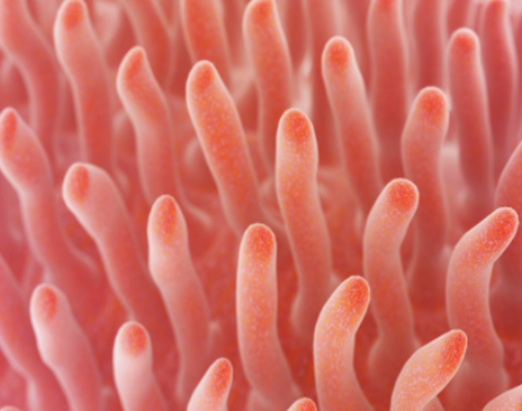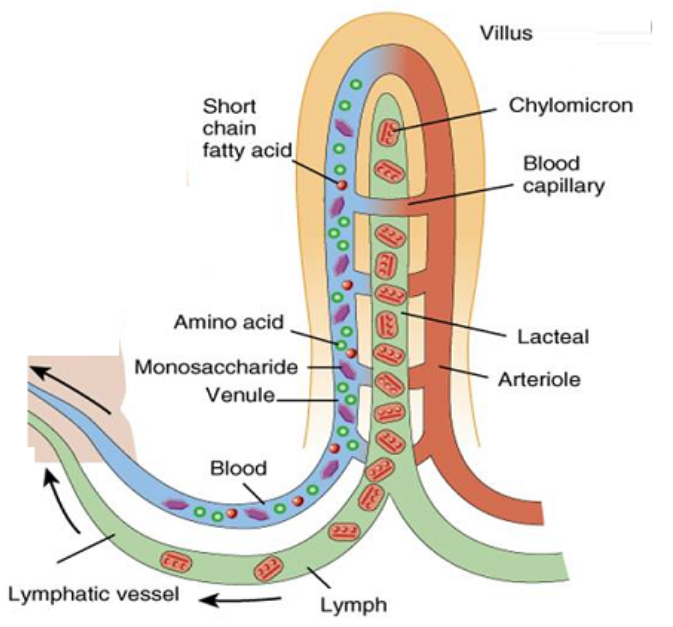
The most important function of villi in the small intestine is
A) To provide strength to the intestine.
B) To provide space for capillaries and lacteals
C) To provide increased surface area for absorption of the digested food.
D) To provide habitat for bacteria
Answer
594k+ views
Hint: The digestion of food begins in the mouth and is completed in the small intestine. The small intestine is lined with a small finger-like projection known as villi.
Complete answer:
The entire length of the small intestine is lined with small finger-like projections which helps in the absorption of the nutrients from the food which is ingested and when the food has been broken down into nutrients, vitamins. proteins etc from the stomach to the small intestine. The absorbed nutrients are passed on to our bloodstream. These nutrients are further used for the metabolism of the body and help in performing various metabolic processes. As digestion is completed in the small intestine therefore absorption of nutrients must take place in the small intestine. The presence of villi on the surface of the small intestine increases the surface area which increases the absorption. (Please refer the diagram given below)
Villi are just the tiny projection that helps in the absorption of nutrients. They don't have any role in providing strength to the small intestine. Therefore, option (A) is incorrect. Villi do not provide space for capillaries and lacteals (the lymphatic vessels of the small intestine which absorb digested fats). Hence, option (c) is also incorrect. Small intestine doesn't need any specific structure to provide a habitat for bacteria in our body. Villi in no ways provide that function. It does not provide any importance to the small intestine.


Hence, option ‘C’ is correct.
Note: Absorption refers to the movement of nutrients, water, and electrolytes from the lumen of the small intestine into the cell, then into the blood. Without the presence of villi, this function of the small intestine will be difficult.
Complete answer:
The entire length of the small intestine is lined with small finger-like projections which helps in the absorption of the nutrients from the food which is ingested and when the food has been broken down into nutrients, vitamins. proteins etc from the stomach to the small intestine. The absorbed nutrients are passed on to our bloodstream. These nutrients are further used for the metabolism of the body and help in performing various metabolic processes. As digestion is completed in the small intestine therefore absorption of nutrients must take place in the small intestine. The presence of villi on the surface of the small intestine increases the surface area which increases the absorption. (Please refer the diagram given below)
Villi are just the tiny projection that helps in the absorption of nutrients. They don't have any role in providing strength to the small intestine. Therefore, option (A) is incorrect. Villi do not provide space for capillaries and lacteals (the lymphatic vessels of the small intestine which absorb digested fats). Hence, option (c) is also incorrect. Small intestine doesn't need any specific structure to provide a habitat for bacteria in our body. Villi in no ways provide that function. It does not provide any importance to the small intestine.


Hence, option ‘C’ is correct.
Note: Absorption refers to the movement of nutrients, water, and electrolytes from the lumen of the small intestine into the cell, then into the blood. Without the presence of villi, this function of the small intestine will be difficult.
Recently Updated Pages
Master Class 10 Computer Science: Engaging Questions & Answers for Success

Master Class 10 General Knowledge: Engaging Questions & Answers for Success

Master Class 10 English: Engaging Questions & Answers for Success

Master Class 10 Social Science: Engaging Questions & Answers for Success

Master Class 10 Maths: Engaging Questions & Answers for Success

Master Class 10 Science: Engaging Questions & Answers for Success

Trending doubts
What is the median of the first 10 natural numbers class 10 maths CBSE

Which women's tennis player has 24 Grand Slam singles titles?

Who is the Brand Ambassador of Incredible India?

Why is there a time difference of about 5 hours between class 10 social science CBSE

Write a letter to the principal requesting him to grant class 10 english CBSE

A moving boat is observed from the top of a 150 m high class 10 maths CBSE




